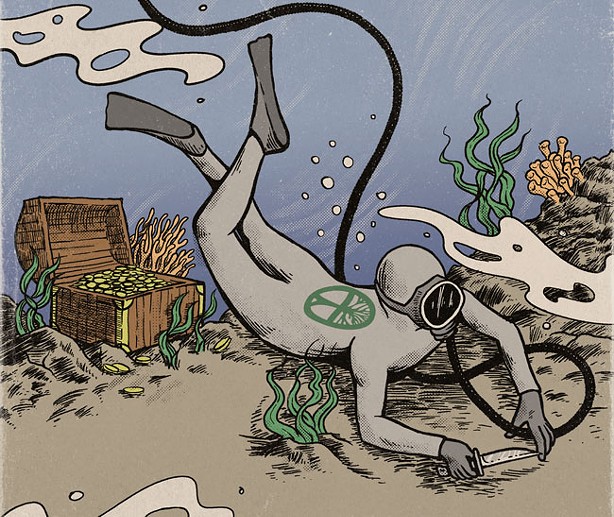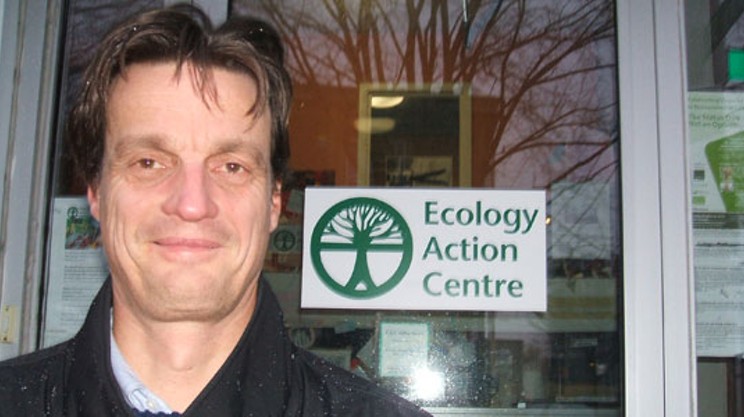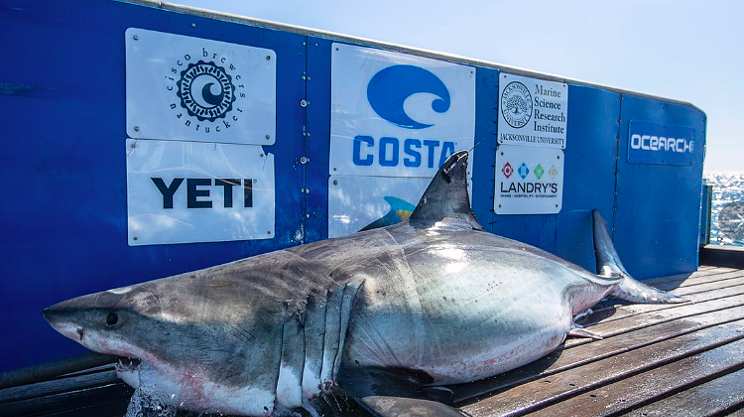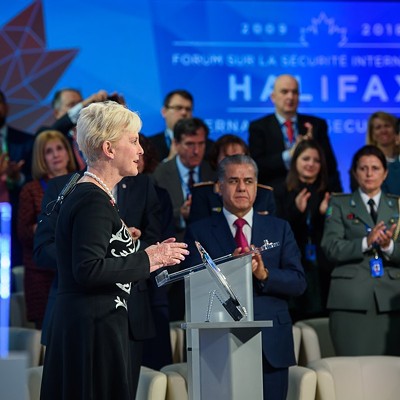No one’s speaking, but beneath the surface there’s disquiet.
Over 60 supporters of the Ecology Action Centre rustle in their seats at the not-for-profit’s annual general meeting last week, inside the Halifax Forum’s Maritime Hall.
For the first time ever, the media is in attendance. Reporters are placed off to the side by the cake and refreshments and asked not to interrupt.
Tonight is for the members to ask questions, and they’ve come well-armed.
It’s been just two months since the EAC rejected a $6.25-million grant and fired its marine conservation superstar Susanna Fuller. Since those events, four more marine team members have quit and two board members resigned.
So far there’s been no solid explanation given as to why marine staff are abandoning ship. Or why one of the EAC’s strongest activists was tossed away. Or why the organization’s directors turned down an unprecedented funding opportunity.
Now, all that confusion is bubbling up at the AGM.
Longtime members—people who’ve pledged their support to the Ecology Action Centre over several decades—repeatedly stand, state their tenure with the organization and voice their bewilderment.
“What on earth could be going on?” asks former EAC director Howard Epstein. “I’m left, and I have to say, entirely puzzled by what we’re looking at...entirely puzzled and worried.”
Board co-chair Candace Stevenson tells the room that these past few months have been “challenging.” It’s an understatement.
A crisis of leadership is threatening the Ecology Action Centre’s workplace and its reputation. Former employees say the bedrock of environmental activism in Atlantic Canada has put itself at risk through poor management and dubious decision-making. Now, the EAC is struggling to right the ship before it sinks any lower.
Calming the crowd at the AGM is the first task. Unfortunately, there isn’t
“You’re a lawyer,” board co-chair Denis Leclaire says to Epstein, in exasperation. “What would you suggest we do?”
The reply is instant.
“Talk.”
It took months for Susanna Fuller to broker what would have been an unrivaled wave of funding for the Ecology Action Centre. The Pew Charitable Trusts was offering $1.25 million USD each year for five years to fund marine conservation work in the Maritimes.“To date, this process has been riddled with misinformation, miscommunication and mistrust.” —Marine team staff in a letter to the EAC board
tweet this
Most of the proposed grant would have gone towards ramping up the EAC’s already world-renowned marine unit. It would have meant more consultations with fishers, more projects, more staff and better pay.
The deal was finally secured back in February, then promptly rejected by the EAC’s board on the recommendation of operational directors Mark Butler, Marla McLeod and Carla Vandenberg.
From the outside looking in, it’s a baffling decision. A not-for-profit that subsists entirely on fundraising chose to turn down an incredible amount of funds raised.
“It’s always hard to turn down money,” says McLeod.
It also caught members of the marine team by surprise. Former employees who asked not to be named
McLeod says an alternative for spending the money “wasn’t what was presented to us.”
The managing director doesn’t quite answer when asked if the marine team was informed ahead of time that the grant would be rejected.
“There are all sorts of conversations that take place around grants,” she says. “We did have discussions with Susanna and the marine team about the grant. In this case, when it came right down to it, we realized we couldn’t accept it.”
The problem, according to McLeod and the other directors, is that the bigger the funding, the bigger the administrative burden.
“All of the contracts, fiscal management and all of the paperwork that goes with being a charity,” she explains.
The Ecology Action Centre is already “feeling the stretch” from a 38
“Simply put, it was just too much, too quickly,” says McLeod.
There was another problem. The marine staff wanted raises and the directors weren’t prepared to offer any.
A copy of board member Megan Bailey’s resignation letter, obtained by The Coast, recounts how the marine team’s request for a pay bump was deemed unnecessary because they don’t have kids and their spouses work.
“The team has asked for fair wages compared to marine teams in other organizations,” Bailey writes. “They have been told that they don’t have children, or they don’t have mortgages or they have working husbands and thus should not be asking for more money.”
Bailey did not respond to request for comment about the details of her letter. Likewise, McLeod would not comment about the multiple resignation letters provided anonymously to The Coast.
She says she holds the privacy of current and past employees very highly, especially when it involves workplace conflicts.
McLeod did, however, confirm the veracity of several other emails between the marine team and the EAC board that were part of the same package of documents obtained by The Coast.
She also admits that while EAC’s compensation is equal to that of other non-profits in the region, staff are paid less than their counterparts doing national environmental work.
One former employee estimates the eight marine team members were making between $10,000 to $15,000 less than employees doing similar work in Canada. They had proposed a salary increase of $8,000, which the ex-staffer says would have bumped the highest-paid team members to $55,000 a year.
Speaking generally, McLeod says handing out raises for a single unit isn’t possible given the EAC’s pay equity policy. The highest-paid employee working for the centre can’t make more than four times that of the lowest-paid employee.
“We can’t have one team that’s paid more than the other teams,” she says.
To be cliché, a rising tide needs to lift all the boats.
To that end, the EAC has been undergoing a salary review since the start of the year to see how it can raise pay levels for over 40 employees all at the same time.
The marine team is certainly amongst the highest paid out of the EAC’s workforce, but the team is—was—also responsible for bringing in the largest amount of funding.
Total project money received last year for the organization came in at close to $3 million. Over a third of that was for the marine team’s work. No one else even came close.
The marine team is, unquestionably, the biggest branch of the Ecology Action Centre’s ecosystem. It brings in the most funding, employs the most staff and arguably has had the most success. Fuller has been a keystone to those accomplishments.“On a personal level, we are feeling hurt, betrayed, disrespected and misled by this process.”
tweet this
She’s a bonafide star in the field of ocean conservation, having worked with the United Nations on high-seas fisheries management and studied Canada’s legislation on Marine Protected Areas.
Over her 12 years as the EAC’s marine action coordinator (out of 23 years total with the organization), her policy work has been repeatedly recognized both locally and internationally. She was even a member of the Ivany Commission, for whatever that’s worth these days.
Suffice to say, there would have been some exciting opportunities for Fuller and her team with the Pew money in hand. And the executives knew that turning it down would also likely mean her departure.
Bailey’s resignation letter says that at a February 26 board meeting, the directors acknowledged rejecting the grant could cause Fuller and other marine staff to quit.
But rather than wasting the grant opportunity completely, Fuller instead proposed using the funds to spin-off the marine unit’s work outside the EAC’s purview.
In emails sent to the board, marine team members stress that ocean conservation work would continue at the EAC, which would work in tandem with the new organization. But the status quo, they felt, was unsustainable.
The team’s ability to grow within the Ecology Action Centre had reached its limit. The only win-win-win for the marine team, the EAC and the oceans themselves would be to chart a new course.
It was swim or sink.
According to Bailey’s letter, Fuller was asked to write up the transition idea and present it to the executive. When she did, they fired her for it.
“She provided the requested information, which was then used to fire her,” writes Bailey. “The directors made a choice to view the coordinator in
In her resignation, Bailey says the “unjust firing” shows a lack of respect and a “shocking inability or unwillingness to truly understand the needs of a team that has raised, through the leadership and dedication of their coordinator, the status of EAC to international acclaim.”
Fuller declined to comment when contacted by The Coast, but some of her former colleagues back up the claims made by Bailey’s letter.
“They got rid of Susanna and they thought the problem was gone,” says one former EAC employee. “Except we all agreed with everything she was upset about. So the problem wasn’t gone, which is why everyone is quitting.”
In the wake of Fuller’s termination, there was a new urgency to deal with the “grave concerns” several marine team members had about the EAC’s management.“I have watched the working culture of the organization become toxic...It has been left broken by this series of decisions, which were accompanied by poor communication and a lack of transparency and compassion.” —Marine resignation letter
tweet this
There was the grant rejection, sure. There was also the pay raise dismissal and now the confusing circumstances of Fuller’s termination.
Their leader was flushed down the drain, taking with her 12 years of community relationships and institutional knowledge. The surviving marine team was left to clean up the mess. When concerns were voiced, the issues were met with hostility. They were treated as replaceable—as collateral damage.
In their resignation letters, former employees describe what felt like a lack of respect for all EAC staff. They distrusted the executive—especially policy director Mark Butler—because of what had occurred.
There was also a sudden micromanaging of what was previously a largely autonomous operation. Former marine staff say they felt blindsided by the directors’ sudden interest and control of their work. It disrupted the natural balance.
McLeod says the standard operating procedure at the EAC is that individual teams are considered the experts and left to themselves. But in times of upheaval, the directors get more involved to offer support.
Butler declined to be interviewed for this story, though McLeod vouches for him as tirelessly dedicated to his work.
If anyone had any complaints about his role as policy director, McLeod says she hopes they would bring those complaints to her directly.
It appears they did. The marine team’s correspondence claims they met with McLeod on several occasions. After not receiving a satisfactory solution, the employees bypassed the directors completely and sent a letter to the board hoping to resolve the conflict.
“This process has taken a serious toll on the mental health of many members of the team and made it challenging for staff to physically be in the building,” the letter reads. “It has crippled the ability of staff to productively tackle their work.”
The team urged the board to strongly consider an external leadership review—the first of its kind since Butler took over in 1994—before the organization’s reputation was damaged further.
“From our perspective, and that of
The board writes back that it has complete confidence in the EAC’s directors and a leadership review is not an option at this time.
Instead, an offer is made for an outside facilitator to come in and help re-establish a cordial and respectful working relationship.
In follow-up emails, the marine team asks for specific objectives beyond “re-establishing cordiality.” They want a clear interim leadership structure and specific instructions for the directors’ involvement in the marine team’s work.
It doesn’t appear they the received the answers they were looking for.
In short order, marine communications coordinator Heather Grant, sustainable fisheries coordinator Chelsey Karbowski, conservation officer Travis Aten and sustainable seafood coordinator Colleen Turlo all resign.
Board members Meghan Bailey and Karen Traversy also step down.
“The marine team dreamt big and was rewarded with an amazing funding opportunity, only to be punished for it,” reads one resignation letter.
“Relationships are really at the heart of all this work and we take those relationships very, very seriously.” —Marla McLeod
tweet this
Challenging times are when you take the chance to learn and figure out the best path forward, says McLeod. And these are challenging times.
“I think that we’re all working through this in the best way that we can. I won’t say it’s not been difficult.”
Along with the aforementioned salary review, the EAC is moving forward with that outside facilitator. They’ll review growth plans, meet with staff and identify any decision-making issues. That’s the plan, anyway.
A motion for an external review of the directors’ funding and HR practices was brought
All of these efforts are trying to solve the biggest problem facing the EAC—the question to which McLeod and the directors don’t yet have an answer.
“How do we grow well?”
The Ecology Action Centre is still wading through that quandary, and this latest public relations storm, hoping to emerge with its integrity intact.
Until then, there simply isn’t much the organization is willing to say about the turmoil in its waters.
The Ecology Action Centre has always tried to move through tough times with openness and respect for staff, says McLeod.
“




















